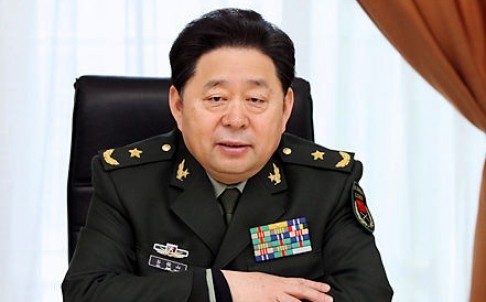Official offered bribes of 40 million yuan to boss in bid to escape corruption charges
PUBLISHED : Friday, 23 January, 2015, 1:33pm
UPDATED : Friday, 23 January, 2015, 6:38pm
Zhuang Pinghui [email protected]

Former lieutenant general Gu Junshan, who reportedly implicated his boss, former general Xu Caihou, when he realised Xu could not save him from corruption charges. Photo: SCMP Pictures
A Chinese official offered bribes of more than 40 million yuan (about HK$50 million) to his boss in a last-ditch attempt to save himself after being charged with corruption.
Former lieutenant general Gu Junshan, who was deputy head of the People’s Liberation Army General Logistics Department, confessed – and reportedly implicated former general Xu Caihou – when he realised Xu could not save him from charges of embezzlement, bribery, misuse of state funds and abuse of power.

Former general Xu Caihou, who retired last year as vice-chairman of the powerful Central Military Commission, is being investigated on suspicion of corruption. Photo: Reuters
Gu, who was sacked after being detained in 2012, admitted offering bribes to Xu, who retired as vice-chairman of the powerful Central Military Commission last year. Xu is now being investigated on suspicion of corruption.
Details of Gu’s attempts to escape justice – and subsequent confession that implicated Xu – were revealed in an article by Honesty Outlook, a Sichuan provincial magazine that focuses on anti-corruption.
The magazine’s report examined the last-ditch efforts of officials to avoid prosecution after being investigated on suspicion of corruption.
The officials’ efforts include not only offering bribes, but also include making threats to others, seeking help from influential contacts, making claims of their innocence, or implicating other people in an attempt to gain a more lenient punishment.
Inspection teams often received anonymous threatening phone calls or letters, the magazine reported.
Some inspectors were told to told “go away and have some fun, otherwise you will meet an unfortunate ending”.
One village party secretary and his brother had a whistleblower killed after he reported had them of corruption and identified himself to senior officials using his real name.
Another official at the Qidong county bureau of commerce and industry threatened to “throw all the disciplinary investigators out of the window” after growing angry when they examined his bank accounts.
A corrupt official, who was suffering from cancer, threatened to commit suicide if he was investigated. He was eventually put under party internal disciplinary investigation.
A more discrete way used by corrupt officials is to try to bribe investigators carrying out the corruption inquiry.
Wei Jian, a director with the anti-graft watchdog, the Central Committee of Discipline Investigation, is believed to have tipped off corrupt officials in the provinces for which he was responsible.
He was detained and placed under investigation last May on suspicion of corruption.
Hu Zhizhong, former chief procurator of Zhongyuan district People’s Procuratorate, in Zhengzhou, also reportedly bribed staff investigating his case so he could collude with other people involved in the case.
The magazine reported that the most common tactic used by officials detained on suspicion of corruption was to form an alliance with other people involved the investigation.
The tactic had been used by Gao Jianyun, a former official with the Communist Party body set up to make the internet more secure. Gao, who worked at the Office of the Central Leading Group for Cyberspace Affairs, was sacked after being detained by investigators last September.
Xu Jianlong, former head of the Hancheng Land and Natural Resources Bureau, in Anhui province, also tried to form alliances with other people involved in his case.
